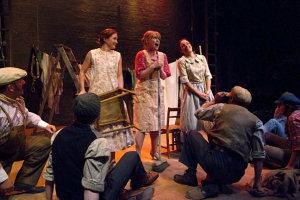Carousel Review 2014
I often find myself having to work quite hard to defend Carousel for being one of my favourite musicals of all time. Despite Rodgers and Hammerstein's glorious score, its rousing set pieces and a magnificent ballet sequence, many people find the book dated, unforgiving and too quick to trivialise themes of domestic abuse. To me, the simple honesty of the story, the humour of the supporting characters and an undeniable masterpiece of a score makes this the stand out contribution to the 'classic' musical repertoire, and a show to which many future musicals owe a great deal to.
Morphic Graphitti's production calls itself a 'bold reimagining' which has the potential to instil fear into purists and raise eyebrows amongst fans of R&H's works. With iconic productions cemented so firmly into audiences' minds (most notably Hytner's 1992 National Theatre production) and two recent West End outings, you may wonder what exactly is left to discover in this piece. Morphic Graffiti's intimate and thoroughly sensitive production not only shows incredible creativity, but also manages to unearth a simple honesty and rawness which cements it as a definitive reworking and a necessary addition to the London fringe.
Director Luke Fredericks has grabbed the piece by both hands and succeeded in creating a thoroughly respectful and sensitive re-imagining of this classic show. Updating the action to America in the 30s adds a completely different dimension to the carousel circus in which the show begins, feeling a mix between 'Side Show' and Dianne Paulus' 'Pippin', which strips away some of the saccharine romance and provides a much grittier context for the entire production. One of the biggest challenges facing any director is the shift to Heaven in the second act, which often sparks disaster in any production. Here Fredericks extends the fairground theme to effectively cover this clunk in the book, and Billy's return to earth goes by (almost) unquestioned.
Some of the greatest staging comes not from the bigger concepts of the piece but the attention to detail in telling the smaller moments. The staging of 'When The Children are Asleep', performed by a wonderful Joel Montague as Enoch Snow, (in various stages of undress) breathes new life into an otherwise action-stalling number, and it's clear the attention that has been paid to staging every second of the show.
Lee Proud's choreography is space defying and narrative throughout. He is aided by a beautiful set of dancers who recreate his work with perfect energy, commitment and truth that both updates each number but nods to the shadow cast by Agnes de Mille's original. Here, Susie Porter dances the ballet beautifully, capturing the torments of a young Louise and effectively builds to the conclusion.
The Arcola presents a wide range of problems to the whole creative team, and it certainly isn't the most comfortable (or cool) of fringe venues. In combatting each of these issues, each member of the creative team have turned the limitations into a positive, lead confidently by the ambitious yet fully realised designs by Stewart Charlesworth. The space transforms in front of our eyes from a carnival, to the shores of a New England fishing town within a tight design concept that underpins the whole production.
Musically, the challenges presented are also overcome effectively. With a five piece reduction it is inevitable that many of the dance sections feel bare and sparse, and it does take a while to get used to not hearing the sweeping strings throughout. Tuning issues aside (probably victims of the heat), the balance is spot on and provide an effective realisation of one of Rodgers' most ambitious scores.
There is something refreshing about hearing the rawness of the voices, with no amplification using the space's natural acoustics. On the whole this isn't the most vocally perfect delivery of the score, but in this context it doesn't matter. The honesty and emotion behind each character is present in every number, and the youthful cast rely more on Hammerstein's often genius text which is ultimately more rewarding.
Vicki Lee Taylor's Carrie Pipperidge carries much of the humour but is equally matched by Gemma Sutton's beautiful yet haunted Julie Jordan. Their voices are the strongest in the company, and moments such as 'Mister Snow' and 'What's the Use of Wond'rin?' become highlights of the entire production whilst appearing effortless. Tim Rogers is thoroughly convincing as Billy Bigelow and this is the first time I've seen a Billy who sings like you would imagine the character to sound. Rather than giving a rich, lush baritone, Rodger's gives a raw and powerful vocal delivery which doesn't undermine his character, lifting it out of the well trodden operatic repertoire and placing it firmly in the dramatic one.
This is without a doubt a beautiful and sensitive re-imagining of one of the most perfectly constructed musicals ever written. Seeing this up close and stripped back allows the story to unfold in a brand new and thoroughly compelling way. Morphic Graffiti's production is the most confident, yet respectful, fringe musical I've seen this year, and a perfect example of the talent and creativity that exists away from the commercial lights of the West End.
For tickets to the 2017 London Coliseum production with Alfie Boe and Katherine Jenkins please see here
Originally published on
